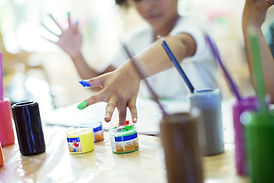
How Art Therapy Can Help Your Child
healing your child with art
You love your child, you try so hard to be a good parent and yet despite that -something isn't quite right. Your child is struggling to control their emotions, they're misbehaving at home or school, or they're just not acting quite like him/herself. You have read every blog, article, and resource and still just feel stuck.
You've now turned to researching therapists in an attempt to help your child and quite frankly- it's overwhelming.
At Empowered Hearts Therapy, we know that children are amazingly resilient and with the right support will thrive.
While it is likely that your child will benefit from therapy, they may find it scary or even difficult to properly express themselves when in a traditional "talk" therapy session. However, in Art Therapy, the therapist encourages your child to communicate thoughts and feelings while utilizing art and play, which is already a very natural and comfortable way they express themselves.
Art therapy is a psychotherapy in which the therapist encourages the client to utilize art in a variety of ways. Art Therapy has been proven to be a successful treatment and utilizes art as a creative outlet for children struggling with the circumstances of their lives.
Children are inherently creative, and because of this, it is usually easier for them to draw a picture than answer questions directly. When trying to talk about certain topics, children may be reluctant or unwilling to talk and this is when art can be utilized. Creating art is non-threatening and it allows children to explore those difficult topics in a creative way.
Below are some examples of some issues that Art Therapy can assist with:
-
Death of a family member or friend
-
Childhood trauma involving physical, mental, or sexual abuse
-
Learning disabilities
-
Emotional issues like fear or phobias
-
Family conflict
-
Deal with the challenges of serious diseases
-
Treating anxiety or depression
-
Help children understand and deal with physical disabilities
-
Understand and treat behavioral problems
-
Build self-esteem
-
Reduce stress
-
Develop healthy and effective coping skills





